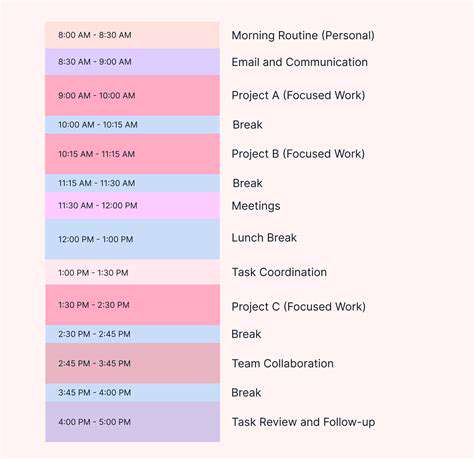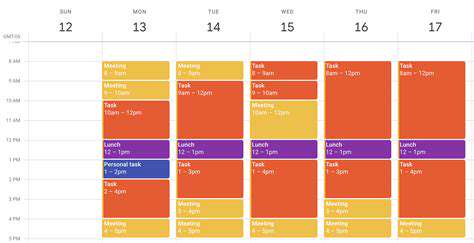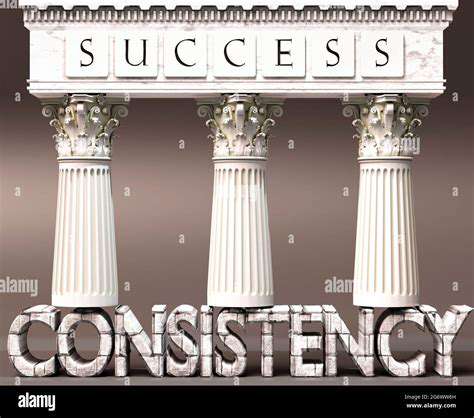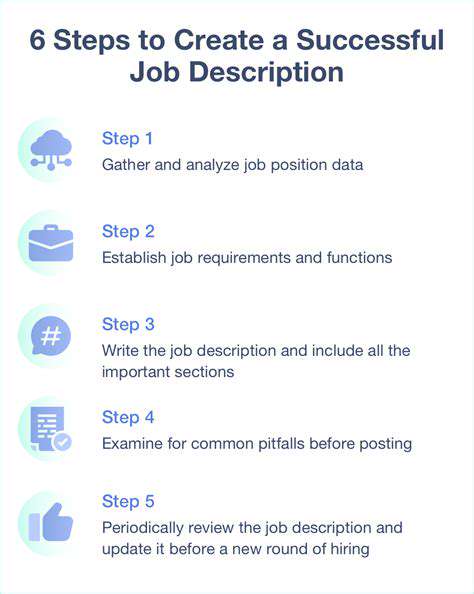How to Manage Your Time as an Entrepreneur
Understanding the Importance of Delegation
Delegation is a crucial skill for effective time management, especially as your responsibilities grow. It's not about shirking your duties, but rather about strategically assigning tasks to others who can handle them efficiently. This frees up your valuable time to focus on higher-priority activities that require your unique expertise and judgment. By understanding the specific strengths and weaknesses of your team members, you can ensure tasks are assigned to those best equipped to complete them effectively, leading to improved productivity and output for the entire team.
Recognizing when and how to delegate is a key component of effective leadership. It demonstrates trust in your team members, fostering a sense of responsibility and ownership. This trust, in turn, can lead to increased motivation and job satisfaction among your team, which can positively impact their overall performance and commitment to the company's goals.
Outsourcing: Expanding Your Capacity
Outsourcing goes beyond delegation by contracting specific tasks or projects to external vendors or specialists. This is particularly beneficial when you need specialized skills or expertise that aren't readily available within your team. Outsourcing can be a powerful tool for streamlining processes, reducing costs, and accelerating project timelines, especially when it comes to non-core functions. For example, if you need specialized graphic design work, outsourcing to a design agency can free up your in-house team to focus on core business functions.
However, careful consideration is crucial when choosing to outsource. Thorough research and due diligence are essential to ensure you select reliable and reputable vendors who can deliver the desired quality and meet your deadlines. Clearly defining expectations, establishing communication protocols, and building strong relationships with your outsourced partners are key to minimizing potential risks and maximizing the benefits of outsourcing.
Outsourcing can also help alleviate workloads, allowing your team to focus on their core responsibilities. This increased efficiency can translate into significant cost savings and improved overall productivity across the organization.
While delegation focuses on internal resource management, outsourcing leverages external resources to extend capacity and expertise, potentially leading to even greater gains in efficiency.
Careful planning and strategic decision-making are essential to ensure both delegation and outsourcing support your time management goals and overall objectives.
Understanding the nuances of both delegation and outsourcing is key to optimizing your time management strategies and achieving greater success in your professional endeavors.
Building a Sustainable Entrepreneurial Routine
Planning and Prioritization
A sustainable entrepreneurial routine hinges on meticulous planning and prioritization. Effective time management isn't about cramming more tasks into your day, but about strategically choosing which tasks deserve your attention and energy. Begin each day by outlining your key objectives. Identify the tasks that directly contribute to your business goals, and tackle those first. Use tools like to-do lists, calendars, or project management software to visualize your workload and allocate specific time slots for different activities. This structured approach reduces decision fatigue and allows you to focus on the most important tasks without feeling overwhelmed.
Prioritization is crucial. Not all tasks are created equal. Learn to differentiate between urgent and important tasks. Urgent tasks often require immediate attention, but important tasks contribute to long-term success. Focusing on important tasks first allows you to build momentum and achieve lasting progress. Categorize tasks based on their impact and urgency to ensure you're directing your time towards the most valuable activities.
Time Blocking and Scheduling
Implementing time blocking is a powerful technique for maximizing productivity and minimizing wasted time. Allocate specific time slots for different tasks, whether it's responding to emails, brainstorming new ideas, or working on specific projects. This structured approach helps you stay focused and prevents tasks from spilling over into other time slots. Consistency is key; stick to your schedule as much as possible to maintain a predictable and productive routine.
Beyond simply scheduling tasks, consider scheduling breaks and dedicated downtime. These breaks are essential for maintaining energy levels and preventing burnout. Plan for short breaks throughout the day to recharge and avoid mental fatigue. Schedule specific time for relaxation, exercise, or hobbies to ensure you're taking care of your well-being alongside your business needs. This balanced approach is vital for sustained productivity and overall well-being.
Delegation and Outsourcing
Recognizing when to delegate or outsource tasks is a hallmark of effective entrepreneurship. Don't be afraid to delegate tasks that can be handled by others, freeing up your time for more strategic and high-impact activities. This might include administrative tasks, customer service inquiries, or even certain aspects of project management. Identifying tasks that can be delegated or outsourced can significantly increase your available time and allow you to focus on your core competencies.
Delegation doesn't mean abandoning responsibility. Clearly define the scope of the task, set expectations, and provide the necessary resources and support to ensure successful completion. By delegating effectively, you're not only saving time but also building a stronger team and fostering a more efficient workflow.
Establishing Boundaries and Saying No
Setting boundaries is paramount for maintaining a sustainable entrepreneurial routine. Learn to say no to commitments that don't align with your priorities or that will compromise your time and energy. This might mean declining additional projects, meeting requests, or social engagements. Defining clear boundaries helps you protect your time and focus on the activities that directly contribute to your business goals.
Effective boundary setting extends beyond saying no. It also involves establishing clear communication channels and expectations with clients, colleagues, and team members. Consistent communication about your availability and capacity prevents misunderstandings and ensures that your time is respected and managed effectively. This clarity is essential for building a sustainable and productive entrepreneurial routine.
Leveraging Technology and Tools
Technology plays a significant role in optimizing your entrepreneurial routine. Utilize project management software, communication platforms, and productivity apps to streamline your workflow and automate repetitive tasks. Choose tools that integrate seamlessly with your existing systems and processes to enhance efficiency and minimize distractions.
Beyond basic tools, explore time-tracking apps and productivity techniques like the Pomodoro method to enhance focus and concentration. These tools can help you identify time-wasting activities and optimize your work sessions for maximum output. By leveraging technology effectively, you can significantly enhance your productivity and create a more sustainable entrepreneurial routine.
Utilizing technology can also help you stay organized and manage multiple tasks effectively. Explore tools that allow you to track your progress, set reminders, and manage your schedule. This organized approach makes it easier to maintain a consistent and productive routine.
Read more about How to Manage Your Time as an Entrepreneur
Hot Recommendations
- How to Stay Productive While Working Remotely
- Tips for Managing Conflict with Coworkers
- Entrance & Certification Exams (升学考试)
- How to Improve Your Storytelling Skills (Speaking)
- How to Find Profitable Side Hustles
- Tips for Preparing for the TOEFL iBT Home Edition
- Guide to Switching Careers from [Industry A] to [Industry B]
- How to Run an Effective Hybrid Meeting
- Tips for Marketing Your Side Hustle on Instagram










